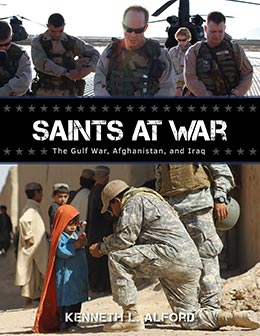Foreword
War is a challenging context to be sure, and there are numerous measures of the sacrifice rendered. Military service is always a family sacrifice, of course, and it can never be forgotten that there are parents, siblings, spouses, and other loved ones who worry and wonder from the home front about the welfare of the one at the battlefront. In the modern day, the media portrays a war’s progress in real time as politicians and pundits debate the legitimacy of that conflict. This imposes additional stresses on both those who serve and those back home who support their soldiers.
It is a genuine privilege to be invited to contribute the foreword for this volume. For many years, I’ve enjoyed my association with Dr. Kenneth Alford, and I’ve looked forward to this day. I have admired Ken’s contributions and scholarship as it relates to documenting the story of Latter-day Saint wartime service in various conflicts. Because of his own military service, he is especially well positioned to help preserve and access the voices of veterans from our more recent wars.
During his career at Brigham Young University, Ken has compiled many accounts of those who have served. He has carefully conducted interviews, acquired accounts, and prepared them to be shared so readers might learn from those who served in the military during these complex times.
This book makes an important contribution. It shares a wide variety of experiences of members of The Church of Jesus Christ of Latter-day Saints who have participated in three separate but related modern conflicts, beginning with the First Gulf War, or Operation Desert Shield and Desert Storm. The second and third wars, initially named Operation Enduring Freedom (Afghanistan) and Operation Iraqi Freedom (Iraq), erupted shortly after the turn of the twenty-first century in 2001 and 2003, respectively. They have been long and protracted conflicts—ranking among the longest wars in American history.
Dr. Alford has set the context for the conflicts and provided helpful timelines as well as overviews for each of the wars. In addition, he and his research team have detailed the approaches to Church organization in the various theaters of operation. Finally, and most importantly, he has presented the accounts of those who were there and who experienced these conflicts firsthand.
One may ask, “What is the value to be derived from a volume like this?” Speaking to students at Brigham Young University in March 2003, on the eve of the war in Iraq, former Church President Gordon B. Hinckley signaled at least one important answer. On that occasion he said, “May those of us who are spared of such [military] sacrifice never be proud or arrogant, but rather humbly grateful for those who lay their lives on the line in time of war.”[1] In truth, just learning the stories of our veterans is a powerful way to evidence our gratitude.
May deepened appreciation and gratitude for the price that is paid be the dividend for those who read this volume, and may God bless those who serve in our military both in times of war and of peace to preserve the freedoms we all cherish.
Robert C. Freeman
Professor of Church History and Doctrine at BYU
Notes
[1] Quoted in Jesse Hyde, “President Hinckley Speaks of War,” Deseret News, March 20, 2003.
